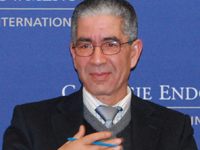Registration
You will receive an email confirming your registration.
IMGXYZ1168IMGZYXMorocco has made significant progress in human rights over the past fifteen years, both by increasing freedom of expression and establishing a commission to investigate past abuses. But continued human rights abuses raise questions about Morocco’s ability to sustain its progress toward democratization.
Ahmed Herzenni, head of Morocco’s Advisory Council on Human Rights, joined by Eric Goldstein, Research Director for the Middle East and North Africa at Human Rights Watch, and William Zartaman, Professor Emeritus of International Organization and Conflict Resolution at Johns Hopkins University, discussed human rights in Morocco and the steps necessary for continued progress. Marina Ottaway, Director of the Middle East Program at Carnegie moderated the discussion.
Discussion Highlights:
- Ahmed Herzenni said the Morocco Advisory Council on Human Rights has fulfilled all of the Truth and Reconciliation Commission’s recommendations for investigating forced disappearance cases. Morocco must continue on the path toward democracy by pushing forward with the following institutional reforms: Modify the constitution to define the judiciary system as independent, and create better oversight of the state security agencies.
- Social dialogue in Morocco is very poor and often only takes place between trade unions and the government; excluding other members of society.
- Eric Goldstein said Morocco’s human rights situation remains nuanced. While an active civil society does exist, further reforms are needed to help ensure the progress it has made is not reversed.
- William Zartaman said it is difficult to understand how Morocco can develop into a democracy where the King enjoys vast political power. Therefore, measuring whether Morocco is continuously moving forward in democratizing remains more important than pointing to where it stands on the spectrum of democracy.
In the question and answer session the speakers addressed the compensation of the Sahrawi people. While Sahrwai citizens constitute almost 25% of people compensated by the Advisory Council, controversy about unapproved cases and unequal amounts of compensation remains. The speakers further commented on political parties. Morocco’s Islamist parties enjoy a wide constituency; however, there is a security approach in handling other Islamist parties that aren’t integrated in the political system. Secular parties are much weaker than Islamist ones and are in need of reform in leadership.
